James R. Callan's Blog, page 6
April 18, 2019
On Double Faults and a Wart: an essay
Modern medicine is amazing. Recently, I saw a woman performing a very physical and energetic dance routine, which included an unassisted backflip. What made this amazing was that the woman had an artificial leg.
But is an example of modern-day medical miracles. Back in the old days, when I was younger (if I say “back”, then of course I was younger), I sought medical help. I had a wart on the end of my left index finger, right at a place that put it squarely in the way of everything I did. Right on the pad of my fingertip. And of course, the left hand is the ball-tossing hand for a right-handed tennis player. I’m certain that any double faults I may have committed in my career to that point were a direct and impossible-to-overcome result of that wart. I hated it. Ken Rosewall—international tennis champion whose size, build, and indeed his strokes, resembled mine—did not have a wart on the end of his ball-tossing finger. There are some conclusions that could be drawn from this. But, I’ll leave those for others to make.
After putting up with it for more years than I care to think about, I sought medical help. A prominent doctor (who also happened to be a neighbor) listened to me complain about it, probably more than once, and said, “Come to my office and I’ll get rid of it.”
Well, you know the rest of that story. I went post-haste.
Now, I must preface these next two paragraphs with the true statement that I have a strong stomach. This is well documented and amply proven during my wife’s first pregnancy, as she was sick and threw up during every meal. I did not lose weight. (Of course, she didn’t either.)
I visited the doctor’s office, eager to rid myself of this handicap. He had me sit on a table, grabbed a needle, jabbed it into my index finger and proceeded to inject my digit with enough fluid that my finger became twice as big around. Next, he took an electric wood-burning instrument, and attacked the wart. This caused it to turn brown, making it even uglier than it had been. But I was okay with that. Whatever liquid he had pumped in, not only fattened my finger but deadened it as well. I watched with fascination.
Next, he grabbed a pair of scissors and with no preamble, no song or dance, no signing of a release form, no reading a privacy notice, not even a request for insurance information, proceeded to cut the entire pad off my sausage finger. If you ever had someone take a pair of scissors and snip off part of your very own body, then you will understand why I almost passed out. I turned white, my head became faint, I saw portions of my early life pass before my eyes (without even a tape recorder handy), and I almost fell off the table. The good doctor steadied me and gave me instructions on taking care of the end of my finger. I had to correct the man. I no longer had an end of my finger. He rephrased and suggested what to do with the stump left behind. And lest I forget that staple of all literature, my stomach roiled.
But, the wart was gone. Halleluiah!
In time, with the miracle of – not medicine – the human body, I grew a new pad. Without a wart. Excitement. And for the next year, it is likely that I never double-faulted again on the tennis court. (Records are sketchy on this, some perhaps burned in a mysterious fire.)
If that were the end of the story, it would never have made the New England Journal of Medicine.
A year or so later, the wart was back. In exactly the same place. The same size. And as annoying as ever. No, not as annoying. Much worse. I had tasted freedom. I had had a smooth, wart-free finger. To say I was unhappy to see this return is to say Paul Bunyan was big. It doesn’t begin to tell the story. But, I was not going back and test my strong stomach again. No snipping off the end of my finger again. I would have to live with an occasional double-fault.
The exciting conclusion, with a mysterious twist, will be coming next week. Stay tuned. It will be worth it. And feel free to leave a comment on this first bit on the wart and double faults. Thanks.
January 4, 2019
She just kept stabbing.
Today I’m sending you one brief scene from Political Dirty Trick, A Crystal Moore Suspense, Book #3.
Crystal jerked her hand to the door and tried to yank it shut but not before the knife found her arm, cutting a long gash nearly to her elbow. The woman stepped closer and raised the knife for another slash. Crystal grabbed the door handle and jerked the door closed. It caught the intruder’s arm, smashing it against the frame of the car. The woman let out a scream, but the knife stayed firmly in her hand. Crystal could see hate and determination in the woman’s eyes. The woman pulled on her arm, trying to get it out from between the door and the car body.
Crystal eased the pressure and the woman yanked her arm out. But before Crystal could get the door closed, the woman reached in for another strike. Crystal was ready and managed to get her arm out of the way. Again she slammed the door against the attacker’s arm. The woman screamed in pain.
Crystal’s right hand grabbed the steering wheel to steady herself, landing on the horn, sending a loud blast into the quiet woods. She released the pressure on the door slightly, then tried to yank it closed again.
Now the woman had her leg inside the door. She would not let her arm get smashed again. Crystal pulled. The door dug into the woman’s leg. But Crystal could not close the door.
The woman let out a stream of curses. There wasn’t enough room to get a good swing with the knife. Crystal tried to keep the door from opening wider, but blood now covered her hand and she could barely hold the door. Slowly the attacker pushed her weight against the door, opening it wider. She was getting enough room for a more deadly attack.
Crystal desperately tried to scramble across the seat, away from her attacker, but the center console held her in easy reach. Managing to take her eyes off the knife, she looked for anything to deflect the knife or otherwise stop the attack.
She found nothing.
The woman was muttering, deep in her throat, almost a growl, as she forced the door open, her knife raised over Crystal’s leg.
The roar of a shotgun blast stopped the woman.
Eula stood outside her back door, shotgun leveled on the scene. But, the car was between her and her target. She had fired a warning high over the car. Eula edged to her right angling for a better shot at the woman trying to kill her granddaughter.
The woman looked at the shotgun and instantly turned and ran in among the trees.
In just a few seconds, Eula was around the car, but the woman had vanished into the woods. Eula pointed the ancient shotgun in the direction the attacker had run and fired another round.
“Probably didn’t hit her, but it ought to keep her running.” She walked over to the driver’s side and looked at her granddaughter. “What’s going on?” Then she spotted the blood. “Oh my God. What happened?”
Crystal had straightened herself up and was inserting the key, ready to start the car.
“What are you doing?” Eula yelled.
“She’s got to have a car down the drive someplace. I’m going after her.”
“No you’re not. You’ve got blood all over yourself and more blood pouring out.”
“She’ll get away.”
“Let her go. She’s still got a knife and you don’t. Let’s go take care of your arm and call the Sheriff.” Eula reached in and pulled the keys out of the ignition. “Come on.”
Crystal eased out of the car. Blood covered her left arm, and splotches of red decorated the left side of her blouse and part of her pants. “That crazy woman tried to stab me.”
“Didn’t just try. Let’s get you in the house and see the damage.”
By the time they got inside, Crystal’s adrenaline had slowed, and she began to shake as tears filled her eyes. Eula wrapped her arms around her granddaughter.
“I couldn’t move. She just kept stabbing, stabbing.”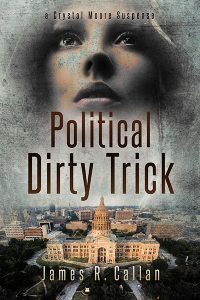
Eula drew her closer. “It’s alright now. Sorry I didn’t get off a better shot.”
Well, Crystal has escaped again – with a little help from her 78-year-old grandmother – and a shotgun. If this didn’t ring true, leave me a comment and tell me what went wrong. This is from Political Dirty Trick, A Crystal Moore Suspense, Book #3. It’s on Amazon in digital, paperback and audio. Click this link: https://amzn.to/2pIHMqs The hardcover version is at Ingram.
December 11, 2018
Lovely Night to Die
Lovely Night to Die is a new thriller novella from Caleb Pirtle III. If you know  his work, you know that Caleb is a terrific storyteller. And he can pull you into a scene and your heart will be racing. Here’s a brief blurb.
his work, you know that Caleb is a terrific storyteller. And he can pull you into a scene and your heart will be racing. Here’s a brief blurb.
Why should she fall in love with a man she defended in court? Does she know he’s a CIA assassin? Does she know he has orders to kill the President? Does she know she will die if he fails? What else doesn’t she know?
Roland Sand has killed two government operatives sent to execute him. He is arrested and represented in court by a beautiful young public defender, Eleanor Trent. Their eyes connect. So do their hearts, but both keep their feeling buried deep inside them.
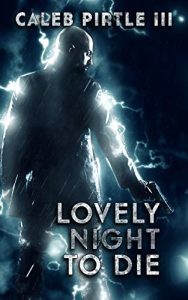 Eleanor does not know that Sand is an assassin for a rogue intelligence agency that sells its deadly services to foreign nations as well as to its own country. He has angered his chief, the one-eyed Bohemian, by refusing to kill an accountant who accidentally saw the details of a top-secret mission. Sand sees no reason why an innocent man should die.
Eleanor does not know that Sand is an assassin for a rogue intelligence agency that sells its deadly services to foreign nations as well as to its own country. He has angered his chief, the one-eyed Bohemian, by refusing to kill an accountant who accidentally saw the details of a top-secret mission. Sand sees no reason why an innocent man should die.
The Bohemian’s agents kidnap Sand and take him from the Durango, Colorado, jail. He is given one chance to redeem himself. He must carry out the assignment to assassinate the President of the United States. It is a mission sanctioned from inside the United States government.
Eleanor is furious, and she is frightened. She has lost cases before. But never has she lost a client. In desperation, he calls Navy SEAL Commander John Nickols to help her track down the missing Roland Sand. She handled a case for one of Nickols’s friends years earlier, and he said she could count on him if she ever needed him.
At Midway Airport, Sand awaits the arrival of Air Force One. The President comes down the steps, and Sand sees Eleanor in the greeting committee. He is told, “Kill the President or we kill the lady.” He has only a second to make up his mind.
And Nickols knows, if necessary, he must kill Sand to save the President.
If you’d like to find out who is left standing, check out Lovely Night to Die on Amazon at: https://amzn.to/2EfJVSC And leave a comment, or a guess, or just a Merry Christmas. Thanks,
jim
October 15, 2018
From the Past – Important Today
Libraries have been improving the lives of people since back to 2600 BC. The earliest libraries had records (books) on clay tablets, with one library containing over 30,000 clay tablets. Then things got better with the use of papyrus. As far back as 700 BC there is evidence of a library classification system being used in Nineveh, an Assyrian city. The Library of Alexandria, in Egypt, was the largest and most significant library of ancient times, established around 300 BC. It was considered to be the major center of learning.
2600 BC. The earliest libraries had records (books) on clay tablets, with one library containing over 30,000 clay tablets. Then things got better with the use of papyrus. As far back as 700 BC there is evidence of a library classification system being used in Nineveh, an Assyrian city. The Library of Alexandria, in Egypt, was the largest and most significant library of ancient times, established around 300 BC. It was considered to be the major center of learning.
Most certainly libraries have played an important part in developing the culture in the U.S.. My parents lived through the great depression. There was no money for anything but absolute necessities. So they checked out books from the library and read them aloud to one another. What a great bonding experience – one that lasted well over fifty years.
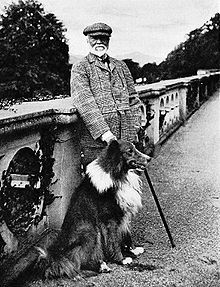 Andrew Carnegie, pictured at the left, was instrumental in establishing many, many libraries in small towns all across America.
Andrew Carnegie, pictured at the left, was instrumental in establishing many, many libraries in small towns all across America.
When Earlene was young, with no TV and no electronic games, the library was a lifesaver. Each Saturday, her mother would take her into the small town nearby. Earlene was allowed to walk to the library while her mother visited the grocery store. So, while the mother shopped, Earlene would collect as many books as she could carry. Then she would read furiously during the week to finish all those books so she could return those the next Saturday and then get more books. What a great influence. And that love of books and reading has continued throughout her life and is still strong today.
I was reminded recently of the vital role that libraries continue to play. A friend with Ramsay Hunt Syndrome said “I would have been lost the past three years without the library having audio books. I’ve always been an avid reader and this problem with my eye has made that so difficult.”
So libraries have adapted and now include not only paper books, but digital books, audio books, and in some cases, DVDs. In fact, I wrote a blog sometime back about a library in Bexar County, Texas that featured only digital books. Of course, they also had computers and gave many classes on a variety of topics. This library has proved to be very popular and has convinced other agencies to build such a public service. Digital. No paper books.
As authors, we should support libraries. They allow our work to be seen by a wider reader group. And even as our world is changing, and digital technology in many forms is becoming the method of choice for the younger generations (all those who do not remember a time when phones were attached to a wire, and to read meant to hold a paper book), libraries have a role to play, one that is good for readers, and for writers.
August 31, 2018
What Makes a book a good ‘tiger’ book?
Today’s guest blogger is Elaine Faber, who lives in northern California with her husband and multiple feline companions. She is a member of Sisters in Crime, California Cat Writers, and Northern California Publishers and Authors. She has two series going, one centered around cats (surprise, surprise) and one centered on an older lady who solves crimes in the 1940s. If you like books where the cat seems to help solve the mystery, then grab one of her Black Cat mysteries. If you like a little history intertwined with a good mystery, then grab a Mrs. Odboddy mystery. And if you just like any good mystery, any of Elaine’s books will work for you. Here’s what she has to say about a good book.
with her husband and multiple feline companions. She is a member of Sisters in Crime, California Cat Writers, and Northern California Publishers and Authors. She has two series going, one centered around cats (surprise, surprise) and one centered on an older lady who solves crimes in the 1940s. If you like books where the cat seems to help solve the mystery, then grab one of her Black Cat mysteries. If you like a little history intertwined with a good mystery, then grab a Mrs. Odboddy mystery. And if you just like any good mystery, any of Elaine’s books will work for you. Here’s what she has to say about a good book.
A good book has an exciting beginning, a compelling middle, and a satisfying end.
Beginning-Whether a novel is about a lost puppy, a hard-boiled CIA agent, and a killer, a six-headed monster, or a romance with the boy next door, the first page must include an intriguing event, a mystery to solve, a romantic conflict or a specific goal to entice the reader to travel this particular journey with the main character. Mrs. Odboddy–And then There was a Tiger, begins when Mrs. Odboddy finds a ragged shoebox that smells of ‘rat’ on her front porch, her house trashed, and Ling-Ling, the cross-eyed Siamese cat chasing the rat up the living room curtains and out the front door! Right off the bat, the reader knows this is going to be a rollicking ride for the next 270+ pages.
Middle- The middle must not sag or lose momentum. It is the crux of the story, where the character struggles to overcome the obstacles, things go from bad to worse. Mrs. Odboddy is framed for burgling the local market, feels the sting of local gossip and accusations and tries to convince the town of her innocence. Disturbing events with friends and family continue to make life miserable in small town Newbury. The ‘tiger of war’ rages across Europe and we meet the carnival tiger, Shere Khan, who will play a major role in the story. The reader leaves laundry in the dryer and dishes in the sink, turning pages in a mad dash to see what happens next.
End-The ending must tie up all the loose strings, solve all the puzzles and make you wish the story wouldn’t end because you want to spend more time with the characters. Well, lucky you! If you haven’t yet read the first two books in this series, Mrs. Odboddy-Hometown Patriot and Mrs. Odboddy-Undercover Courier, you can order them at Amazon for just $3.99. Mrs. O will not disappoint as she pursues conspiracies and Nazi spies, or carries secret documents to President Roosevelt.
And the Satisfying Conclusion-In a novel’s satisfying conclusion, the hero gets the girl, the killer is captured, the interplanetary six-headed monster is vanquished, or the puppy finds a new home. In the conclusion of our story, due to her misguided and absurd actions, Mrs. Odboddy lands in a heap of trouble. She fears she just might not survive this time, but fate intervenes (as we know it must…This is a cozy mystery/adventure after all). All’s well that ends well…but not until Agnes is off and running toward her next adventure. With Mrs. Odboddy, there is always another ‘tiger.
So, here’s the deal. If a novel has an intriguing beginning, a compelling middle and a satisfying conclusion, our readers will be fans for life. All an author has to do is write another good book with another ‘tiger,’ …and that’s exactly what I’m doing!
Here’s a little blurb on her latest 1940s book: And Then There Was a Tiger.
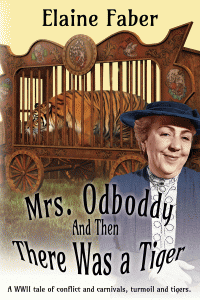 While the ‘tiger of war’ rages across the Pacific during WWII, eccentric, elderly Agnes Odboddy’s patriotic duties are interrupted when she finds a rat-filled shoebox on her porch, her home is trashed, and she becomes the prime suspect in the Wilkey’s Market burglary.
While the ‘tiger of war’ rages across the Pacific during WWII, eccentric, elderly Agnes Odboddy’s patriotic duties are interrupted when she finds a rat-filled shoebox on her porch, her home is trashed, and she becomes the prime suspect in the Wilkey’s Market burglary.
A traveling carnival with a live tiger joins the parishioners’ Harvest Fair at The First Church of the Evening Star and Everlasting Light. When counterfeit bills are discovered at the carnival, and the war bond money goes missing, Agnes’s attempts to restore her reputation and locate the money lead her into harm’s way. Then she stumbles upon a friend’s betrayal and discovers even more about carnival life than she bargained for. Join Mrs. Odboddy on her hysterical romp through pumpkins, war bonds, counterfeit money, and tigers. Filled with laughter and suspense, you will enjoy a bit of history along the way.
August 24, 2018
Why and How
A couple of weeks ago, I sent a scene that was cut from A Silver Medallion to several friends. The response was gratifying to say the least. They not only liked it, but questioned why it had been left out. They felt it was a powerful scene. It’s a little long for a blog, but I wanted to share it with you. And I’d love to hear your reaction to it. Rosa has been found in a shed at Eula’s house.
Crystal began again the painstaking task of discovering what had brought this beautiful young Mexican woman to Eula’s home in the piney woods of East Texas. Gradually, in a mix of Spanish and English, her story emerged.
She was twenty-three years old and until a year ago, she and her husband, Miguel, had been living in Santiago, Mexico. They were anxious to start a family, “to make niños,” she said. But neither could find a decent job. They had no training and when they did get work, often they earned no more than fifty pesos a day.
Crystal whistled. “Fifty pesos! That’s about five dollars. A day. Can you believe that, Nana?”
Rosa smiled self-consciously and continued. She and Miguel lived with her parents, and had only a two by three-meter room to call their own.
One day, Federico, a man they had seen around Santiago but did not know, offered to buy them a beer—a luxury they rarely had. They accepted. Inside the dark cantina, the three talked about the town, the weather, and work. When Miguel complained that good jobs were impossible to find, Federico replied that much money was to be made in the United States. He spoke of making ten, fifteen, even twenty times as much as they could make in Mexico.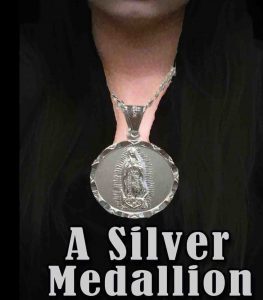
“Federico say he has friend who make thirty times more than Miguel make in Santiago.”
Rosa looked from Crystal to Eula, as if asking them to understand. After a moment, Rosa continued her story.
For several days, she and Miguel could think of nothing else. At night, huddled together on their tiny bed, they would whisper about going to the United States, making lots of money, then lots of babies. Maybe someday they would buy a car, maybe have a house all their own. They laughed, thinking of the possibilities. Then morning would arrive, and as they ate breakfast of tortillas and beans in the kitchen with her parents and her two brothers and three sisters, reality would set in.
Miguel would go out and try to find work. Most days he got nothing. On lucky days, he might make sixty pesos. When Rosa could not find work, she would help her mother wash clothes in the river, pat out tortillas, or tend their small garden.
Then at night, wrapped in each other’s arms, Rosa and Miguel would grin as they talked about making twenty or thirty U.S. dollars for just one day. If they both worked, maybe even fifty dollars. That would be more than 500 pesos in a single day! They would giggle and hug each other tighter. Such a large amount was not possible, but it excited them just to imagine such things.
Rosa grew quiet and gazed out toward the lake. A cool breeze carried a single, golden leaf to the edge of the veranda. After a minute, she started again.
Rosa and Miguel wanted to talk to Federico again, to ask him more about work in the United States, but they would need to return his generosity. They spread all their money on the bed. They had enough pesos for two beers. They should not spend it on that, but searching each other’s eyes, they nodded and left the house to look for Federico.
They found him near the cantina and Miguel offered to buy him a beer. Inside, Rosa declared she was not in the mood for beer; she really wanted some cool water. As Federico drank, they asked him how his friend got to the United States. Federico said to get there and find a job was very expensive.
Rosa squeezed her eyes closed to hold back the tears. They had no money. They would never have enough.
Miguel took a sip of beer, then raised his eyebrows and looked at Federico. “Your friend. Was he rich before he went?”
“No. He was as poor as you, my friend. A man paid his expenses.”
Miguel stared at Federico. “I wish I knew such a man.”
A week later, Federico stopped them on the street.
“Señor Jose de Allende knows a man in Texas who needs a maid.”
Rosa and Miguel looked at each other, grins spreading across their faces.
Federico smiled and continued, “Señor Jose will pay all the expenses to get Rosa to Texas.”
Rosa wanted to jump up and down, scream for joy, and give Federico a hug. But that was not done in Santiago. She tried to sound calm and simply asked, “When would I go?”
“You would leave in four days.”
“Can I go with her?” asked Miguel. “I can look for work after we get to Texas?”
“No. You will stay and work for Señor Jose until Rosa saves enough money to repay Señor Jose. And both of you must save money to pay for Miguel’s trip to Texas.”
“What is the cost? And how much will Rosa make?” Miguel asked.
“Señor Jose has that information. You can ask him before you leave.”
For days, their waking hours were filled with dreams of Rosa working in Texas, and calculating how much she might save. She would buy no clothes, no shoes. She would eat little and spend less. She would save everything possible. She would save money faster than anybody ever had. Miguel would come to Texas soon.
For just a moment in the fading light on Eula’s veranda, a sparkle flitted in Rosa’s dark eyes. “We are much happy. We talk of nothing but go to Texas. We see pictures of Texas on TV in cantina. All people has car, house. I say I keep all my pay, spend nada. Soon mi esposo come to Texas.” As quickly as the shine had come to her eyes, it vanished, replaced by a vacant stare.
“So, this Jose guy arranged it?” asked Eula.
Rosa nodded.
“How did you get here?” Crystal asked.
“It is horrible. We drive two days, five of us in back of car. We only stop for petrol, get tortillas and beans. They make us do bad things. Next night, they put us in boat to cross river. Say make no sound or Americans shoot us. I am so afraid. We are too many for boat but they put all in. I think it go down in water. I no can swim. I want to run, go back to Miguel. But I think of money I make in Texas. Think when my Miguel come to me. I bite my lip, make no sound.”
Crystal bit her lip, trying to hold back the tears. The fear tasted bitter, fear of being packed in a vehicle headed for an unknown destination in a country you had never seen, then forced into an overcrowded boat at night, unable to swim. All manner of sinister situations popped into Crystal’s mind. How desperate Rosa had to have been to risk all on such an uncertain venture.
Rosa told how they were pulled out of the boat, then put them in the back of a truck. She could hear them snap a lock shut. The truck lurched off, throwing those in the back first to one side and then the other.
“We have no light. I can see nada. Smell is asqueroso. After many hours, truck stop and I hear man open lock. When door open, light is so bright we no can look. Sun is very hot. We are in little park with baño. They give us cold hamburger, put us back in truck. They lock door and drive more hours. The heat–I think I pass out. We have no water.”
The Mexican woman closed her eyes and continued in a whisper, “Felipe start to shake. His skin is muy hot, but he say he is cold. We yell, hit wall with fists, but truck no stop.”
Eula shook her head and sighed. “My God.”
Eyes still closed, Rosa’s voice grew even softer and Crystal had to lean close to hear. “When we stop, we carry Felipe out. We are at small stream. We try give him water. But he is no breathing.” She made a small sound, as if she were trying to catch her breath. “Man say he is dead. Put us back in truck. I no know what they do with Felipe.”
Rosa stared down at her hands, clutched together in her lap.
Crystal shivered in horror-struck silence. Felipe died of heat stroke and the smugglers just dumped his body.
“Damn murderers,” Eula muttered.
For a long time, the three sat in silence. Was that the end of the story? Crystal was almost afraid to ask, but she had to know. “What happened next?”
For awhile, Rosa remained silent. Then, without looking up, she continued in a voice now devoid of feeling, “We stop. Door open and we get out. We are in building. They make us take off clothes. All clothes. Antonio say he no do it. Señor Blackwood hit him on head with piece of metal, drag him off. I no see Antonio again. I think he is dead. They take . . .” Her eyes closed.
Crystal and her grandmother exchanged glances, but neither uttered a word.
Rosa continued. “Things. Man give us new clothes. We dress. Others go back in truck. I stay there.”
The sun had slipped below the horizon and darkness sifted down through the trees to envelop the landscape. Light from the living room cast a soft glow on the veranda. Crickets began their nightly serenade, while frogs added the bass notes. Night birds called to one another.
Under normal circumstances, Crystal would sit back and enjoy the night sounds of The Park. Tonight, she tuned them out, waiting for Rosa to finish her story, wanting to hear it—and afraid to.
When she could stand the silence no longer, Crystal asked, “Where was that? Where did you stay?”
“At house of Señor Blackwood. I stay there, until ayer.”
Crystal shuddered. Being forced to undress in front of strangers … to suddenly have no control over your life.
What work did Rosa do? How long did she stay? Did Blackwood demand sexual favors? How did she get away and how did she get to The Park? A thousand questions swirled around in Crystal’s mind, all demanding answers.
The young woman seemed so distraught, so on edge, the wrong question might destroy any chance of hearing the rest of the story, perhaps cause her to run away from The Park. That would be easiest on Crystal¾and Nana. But, the Mexican woman had suffered so much already. She needed their help. Besides, Crystal was so far into this mystery she had to find some answers.
“How long, quanto tiempo, did you work for Mr. Blackwood?” Crystal asked.
“Eleven meses,” Rosa said.
“Eleven months!”
“Why’d you stay so long?” Eula did not share Crystal’s fear of frightening the woman into silence, or flight. “I’d have said, ‘So long Blackheart. I’m out of here.’”
“Were you free to leave?” asked Crystal.
Rosa furrowed her brows and said nothing.
Crystal tried again. “Would Mr. Blackwood allow you to leave?”
Rosa shook her head. “No. He say, I leave, or talk to people, Miguel have accident.”
A few seconds passed before the full meaning penetrated Crystal’s understanding. Rosa could not leave without putting her husband in serious danger. Crystal clamped her mouth shut lest her anger erupt in a scream.
Eula leaned toward the Mexican woman. “How much did you save?”
Vertical grooves formed between Rosa’s black eyebrows. “No entiendo.”
Unlike her usual delivery, Eula now spoke slowly, pronouncing each word carefully. “In eleven months, how much money did you save?”
Eula raised her bushy, gray eyebrows at Crystal.
Crystal took a deep breath, trying to calm herself, and turned to Rosa. “Why did you save nothing? How much did Mr. Blackwood pay you?”
“He say he pay me minimal wage.”
“I’d bet on that,” muttered Eula.
“Was it ‘minimum’ wage?” Crystal asked.
“Si. Minimum wage. But when I asked him for my money, he say he take money for food I eat, room I sleep in.”
Crystal and Eula exchanged looks, but said nothing. Even at minimum wage, she should have made over ten thousand dollars.
“I tell him I eat less. Other time, he say he take money for clothes.” Her shoulders, her mouth, her very spirit, sagged. “Sometime I get five dollars. One time I get ten dollars.”
Crystal frowned. “Five dollars? For a whole day?”
Rosa shook her head. “No day. Un mes.”
“Five bucks for a month. What’d you do for this Blackwood guy?” Eula snapped.
Crystal had wanted to ask the same question, but hesitated. She held her breath, afraid of the answer, angry before it came.
“I do all things. I cook. I clean house. I wash clothes. Plancha.”
“Iron,” Crystal translated for Eula.
“I fix yard, grass. I wash car. I do all things.”
Crystal leaned toward Rosa. “You did all these things and you never got more than ten dollars for a whole month?”
Rosa nodded.
Eula swore under her breath. “Damn crook. He ought to be hung up by his—“
“Nana!”
“She won’t know what I’m saying. And anyways, he ought to be.” Eula softened her tone and leaned toward her guest. “Why’d you leave yesterday?”
Rosa turned away and this time, silent tears started to run down her cheeks. Crystal’s eyes misted over and she wanted to take the young woman in her arms and rock her. Instead, she looked toward the tranquil lake, hoping it might uncoil her stomach, shield her from the anguish permeating the veranda like a dense fog.
Darkness had descended, and off to the left, a slender crescent moon had emerged from behind the pine trees. A thin cloud sliced across the upper part of the silver moon. It appeared like a dagger. A dagger aimed at Rosa.
“Three days back, woman come to work at house. She come from Mexico. We talk. She hear of Miguel, mi esposo. She tell me . . .” Her voice broke and moments passed before she could continue. “. . . he is dead.” The tears started again.
“Dead?” Crystal felt like someone had hit her in the chest. “What happened?”
Rosa wiped her eyes and opened her mouth, but the crush of emotion prevented words from forming. A minute passed, and then another before she could answer. “Lucita tell me he get hurt working at hacienda. Jose no let him go to doctor. Two weeks, he die. She tell me they bury him . . . el mes pasado.”
“Last month!” It exploded almost as a scream. Crystal could feel the vein in her neck throbbing.
She slid over and put her arms around Rosa. The young woman, ramrod straight and somewhat distant until now, melted against Crystal as sobs shook her small body.
Crystal rocked the swing slowly, gently patting Rosa. The woman’s sobs gradually subsided, but an occasional low moan verified her continued grieving.
Crystal held Rosa tightly, both to give the young Mexican woman comfort and to ward off the sudden chill seeping into her. Crystal was not married yet. But she had lost both parents when she was seven and her pain had seemed hopeless for such a long time. No one could comfort her. No one could comfort Rosa.
And then, the chill was gone, replaced by a rising heat. It enveloped Crystal’s stomach first. It moved to her head so that her face felt feverish and she rubbed a hand across her brow, expecting to find beads of sweat. Her breathing accelerated, now rapid and shallow, and her jaw twitched as she clenched her teeth. This Blackwood person had kept Rosa a prisoner, locked in by threats and fear of what would happen to her husband if she left. And when Miguel died, this . . . creature . . . didn’t even tell Rosa.
Bile rose in Crystal’s throat. That Rosa ever found out Miguel was dead was an accident. Jose and Blackwood did business together. Blackwood undoubtedly knew of Miguel’s death long before Rosa found out. But of course he didn’t tell her. That would break the lock on her chains. His slave might escape.
Crystal’s nails dug into the palm of her hand.
Somehow, Blackwood must be stopped.
A Silver Medallion, in paperback and digital formats. http://amzn.to/1WxoEaF
“A Silver Medallion is a gripping, action-packed adventure from talented author James Callan.” NY Times Bestselling Author Bobbi Smith. “A Silver Medallion reads like a gold-medal thriller.” BookLife Prize in Fiction. Readers’ Favorite Book Award Winner.
I welcome your comments. Thanks, jim
August 5, 2018
The Good Old Days
Just got off the phone talking with a friend of mine. He had been to the doctor and was waiting for information on what kind of influenza he had.
And that set me thinking about the “good old days.”
I mean, back then, we only had one influenza. Now we have progressed to multiple types. Wasn’t just one influenza enough?
Of course, I realized what I had been doing for the past two weeks. Trying to get a phone. There are so many companies to choose from. And once you pick a company, there are dozens of plans to select from. Remember when there was only one company? I know. They didn’t have cell phones then. But they might have advanced to have cell phones, right?
Life gets complicated. I was shopping yesterday and one item on the list was “apples.” Easy. Except, at the grocery store there were easily a dozen different types of apples. Which one should I get? Some were better for baking, while others were just right for an apple pie. These were tart and these were sweet and those were crisp, and on and on. I bought grapes. Green, red or black.
No wonder we are having more people with problems. Far too many choices.
We bought a car last year and there was a three-day discussion on the color. I remember Henry Ford who made cars available to the masses. He said you can have any color you want – as long as it is black. Truth be told, I was glad we had more choices in the color. I didn’t want black. Too hot in Texas. I picked maroon. I know. White might be cooler. But I like maroon.
Of course, sometimes, it’s best to stay away from the “good old days.” A few weeks  ago, I was talking about those days to some of the grandkids. And I said, there was a time when you did not have to be at the airport early. You might arrive three minutes before the flight left and you’d get on. They weren’t certain about that. Then, I went too far. I told them that if you missed a flight, as I did occasionally, you could take your ticket to another airline that happened to be going where you wanted to go, and just get on that flight. They questioned that. And I said, it absolutely happened. Just take the ticket from airline A, find the next flight on another airline, say airline B, and walk up to the gate and give airline B the ticket you had bought from airline A. Airline B happily took it and off you went.
ago, I was talking about those days to some of the grandkids. And I said, there was a time when you did not have to be at the airport early. You might arrive three minutes before the flight left and you’d get on. They weren’t certain about that. Then, I went too far. I told them that if you missed a flight, as I did occasionally, you could take your ticket to another airline that happened to be going where you wanted to go, and just get on that flight. They questioned that. And I said, it absolutely happened. Just take the ticket from airline A, find the next flight on another airline, say airline B, and walk up to the gate and give airline B the ticket you had bought from airline A. Airline B happily took it and off you went.
Several of the kids were skeptical. But one just got up and left. He said that could not possibly happen and I was making up stories to confuse him and he wasn’t going to listen anymore.
So, I think I’ll just stop thinking about the “good old days.” And certainly not talk to the grandkids about that time. Of course, for these kids, today will be the “good old days” when they get older. They’ll tell stories about all the good choices they had.
Tell us your favorite “good old days” story. And thanks for stopping by.
jim
July 6, 2018
Happy Birthday, U.S.
It’s July 4th as I write this. The 4th of July always brings back memories of our nation and the great holidays of the past, and the great patriots our country has seen.
our country has seen.
When I was young, there was always a big parade on July 4th. And it was a patriotic parade. Veterans were honored. Rousing, music was played by the bands in the parade. People waved flags, from three and four-year-olds to octogenarians. Most of the movies houses had some sort of a patriotic movie showing. It was an exciting day.
I mentioned that to a friend last week. His reply was, “We’re beyond that stuff now. We get the news of how things really are.”
How sad. I believe we got a truer picture of news in those days. Not in real time. But not slanted to match the preferences of the particular newspaper or radio station. Was it always correct? No. But the term “fake news” didn’t even exist. People believed “if it’s in print, it’s probably true.” Reporters required two independent sources. The common practice today of quoting “a reliable, unnamed source” was not the norm sixty years ago.
I miss the patriotism. I miss the flag being honored. We didn’t let the flag touch the ground; burning one was unthinkable. Should we object when things are wrong, unjust, unfair? Yes. But Gandhi and Martin Luther King showed that peaceful protesting can work. Today, a perceived unjust situation seems to be a permit to burn cars, loot, destroy stores where the owner had nothing to do with the problem, except to be on the wrong street.
I visit Mexico frequently. And while I love Mexico, it misses out on some of what makes the U.S. great. As an example, in Mexico, if you are arrested, you are presumed guilty until you can prove yourself innocent – unlike the U.S. where you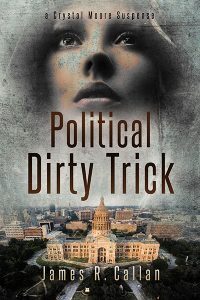 are innocent until proven guilty.
are innocent until proven guilty.
However, the U.S. could learn some things from Mexico. The story in my latest book, Political Dirty Trick, takes place during a gubernatorial race in Texas. The candidates spent nine months campaigning (though the book covers only a small portion of that time). In Mexico, the campaign is limited to two months. Total. Gotta love that. Elections are held on a Sunday. So, all beer and liquor sales are stopped for the Saturday before and the Sunday election day. Of course, that makes the Friday before elections a fantastic day for beer and liquor sales.
Okay, off my soapbox. It’s the 4th of July and I will simply thank God I was born in the United States.
June 29, 2018
A Deadly Dissolution, The Story Behind the Story
Today’s guest is Leeann Betts. She writes cozy mysteries and  Deadly Dissolution is number eight of her By the Numbers series. She’s also written a devotional for accountants, bookkeepers, and financial folk, Counting the Days, and with her real-life persona, Donna Schlachter, has published two books on writing, Nuggets of Writing Gold and More Nuggets of Writing Gold. She also giving away a copy of A Deadly Dissolution to one person randomly selected from those who leave a comment. This is a chance at a free book from an excellent writer.
Deadly Dissolution is number eight of her By the Numbers series. She’s also written a devotional for accountants, bookkeepers, and financial folk, Counting the Days, and with her real-life persona, Donna Schlachter, has published two books on writing, Nuggets of Writing Gold and More Nuggets of Writing Gold. She also giving away a copy of A Deadly Dissolution to one person randomly selected from those who leave a comment. This is a chance at a free book from an excellent writer.
A series is a completely different animal to write than a stand-alone. In a stand-alone novel, you write about characters and events that you hope resonate with your readers, perhaps including an issue or topic that’s close to your heart, such as sex trafficking or the breakdown of the family. And then you’re done, and you can move on to the next collection of characters, settings, maybe a new issue or even the same one told from a slightly different context. A series, however, involves the same or at least some recurring characters, perhaps recurring locations, but different events.
So how to make every story in a series new and fresh, without confusing new readers starting in the middle, or losing existing readers who want some continuity without boredom?
In the case of A Deadly Dissolution, I took a recent event that thrilled me: I had the opportunity to go to Guernsey, Wyoming in October 2017 to see the total solar eclipse. The area was busy but not packed, because most people went to larger metropolitan areas in Wyoming and Nebraska to view the event. However—and isn’t there always a ‘however’?—those other places clouded over and where we were was the perfect viewing location.
I figured—and I say this a lot—“that has to go into a book”.
I did some research, and unfortunately, there were no solar eclipses—total or otherwise—in 2004 or even early 2005 on the east coast. I wanted this story set in Bear Cove, Carly’s hometown, because the last two books were set elsewhere, and I felt I needed to bring readers back to Bear Cove. But I did find out there was a lunar eclipse, and that everything west of New York was clouded over. Which fit perfectly into my story.
To write an effective mystery, we must have several elements:
A compelling premise—mine was that the eclipse brought people to town who would leave as soon as the eclipse was over, so the suspect pool tended to be fluid.
A personal interest—with Carly’s grandson going missing, she now has a murder and a kidnapping to solve, not to mention that somebody was trying to frame Mike for drunk driving. Are the three connected?
A ticking time bomb—if Carly doesn’t solve these cases soon, the culprits could get away, so I closed the highway with Mike’s accident to slow that down.
Red herrings a.k.a. suspects—I introduced several characters that might have done the deed, making sure each one had a good reason to be suspected.
The title was the tricky element this time around. Usually I have the title in my head and simply write the story that goes with it. This time I had the story but no satisfying title. Because of the accounting connection, I wanted something to do with accounting, of course. I settled on A Deadly Dissolution and referred to it near the end of the book. A dissolution is when a partnership dissolves, and it’s not usually amicable.
Question: Do you choose a book based on the cover design, the title, or the back cover copy? Leave your answer in a comment for a chance to win a copy of this mystery.
A randomly-drawn winner will receive a free ebook of A Deadly Dissolution.
About A Deadly Dissolution:
The total lunar eclipse of October 2004 leaves more than Bear Cove, Maine, in the dark. The town’s newly-elected mayor, Walter Akerman, hires Carly to audit the town’s books but is then caught in a compromising situation with his secretary Evie Mack. A journalist in town to cover the eclipse turns up dead. Tom and Sarah’s adopted son Bradley comes to stay overnight to see the eclipse, then goes missing on a walk in town. When Mike’s car is in a serious wreck which the police say is an accident, Carly thinks somebody is trying to send her a message to stay away. How can she solve all these mysteries while not completely wearing herself to a frazzle?
Website: www.LeeannBetts.com Receive a free ebook just for signing up for our quarterly newsletter.
Blog: www.AllBettsAreOff.wordpress.com
Facebook: http://bit.ly/1pQSOqV
Twitter: http://bit.ly/1qmqvB6
Books: Amazon http://amzn.to/2dHfgCE and Smashwords: http://bit.ly/2z5ecP8
June 22, 2018
Now That was Persistence
Persistence
Though we have all seen the various successful writers who could paper their wall with rejections, I ran across one that stopped me cold. I was reading about a massive fire in Sonoma County, CA. It mentioned the damage to the Jack London State Historical Park. The Park Staff transported thousands of historical relics to Sacramento, safe from the fires.
Over a hundred years ago, Jack and his wife were building Wolf House in this same area. It was a massive twenty-six room mansion with stone exterior and a spectacular interior of redwood, oak and walnut woodwork. Just before they planned to move it, it was destroyed by fire.
But the brief note that halted me was the statement that the House of Happy Walls, a Jack London museum, has a collection of the six hundred (600) rejections he received before selling a single story.
Six hundred.
Before selling his FIRST story.
So, that brings us to our word of the week.
Persistence.
“Victory belongs to the most persevering.” Napoleon
Benjamin Franklin said, “Energy and persistence conquer all things.”
And Aisha Tyler suggested, ” Success is not the absence of failure; it’s the persistence through failure.”
So, take heart, writers. Be persistent. The chances of you surpassing Jack London in rejections is small indeed. And yet, we all know Jack London. And kids still read his stories, even a hundred years after his death.
Let’s hear your comments on rejections. How many have you received? And did you ever get one like this: “I haven’t the foggiest idea about what the man is trying to say.” That publisher rejected Catch-22 by Joseph Heller, a novel believed to have been given its name because it was the 22nd publisher, Simon and Schuster, who agreed to take it on. To date: 10 million sales.
My newest novel is not funny. It’s Political Dirty Trick, the third in the Crystal Moore suspense series. Crystal’s good friend Ron Drake is running for the office of governor of Texas. Some believe a political dirty trick might derail Drake’s fast-moving campaign. But something goes terribly wrong with the trick and a man is killed. And things go downhill from there.
And things go downhill from there.
Crystal is determined to find out who is providing fake news to the media. Crystal is persistent. As she finds clues, she becomes a target. Soon, it’s not a question of whether Drake will win or lose, but whether Crystal will be alive to see the outcome.
The Midwest Book Review had this to say: “Powerful in its characterization, plot, and narrative interactions, Political Dirty Trick is the item of choice for thriller readers who like their stories steeped in realistic scenarios and possibilities.” Senior Reviewer Diane Donovan
“It reads like a fast-paced James Patterson cliffhanger.” Author William Doonan
“Political Dirty Trick is relentlessly intriguing and satisfies right up to the memorable climax.” Author Michael Hartnett
“This group of characters gets stronger with each book in this series.” Amazon Customer Adele Weitz
“Political Dirty Trick” by James R. Callan has it all – mystery, murder, political scandal and suspense with a unique cast of characters. It’s a fantastic addition to the author’s Crystal Moore Suspense series and one you definitely won’t want to miss!” P. Gligor, Amazon customer
Political Dirty Trick is available in paperback and Kindle editions at: https://amzn.to/2pIHMqs
And leave a comment on any rejection stories you have – personal or from other famous writers.



